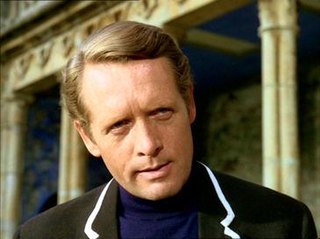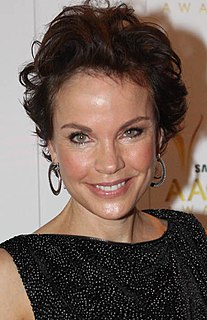See also
- Innocent prisoner's dilemma, a detrimental effect of a legal system in which admission of guilt can result in a lesser punishment
The prisoner's dilemma is a standard example in game theory.
Prisoner's dilemma may also refer to:

The Prisoner is a 1967 British avant-garde social science fiction television series about an unnamed British intelligence agent who is abducted and imprisoned in a mysterious coastal village, where his captors try to find out why he abruptly resigned from his job. It was created by Patrick McGoohan and George Markstein, with McGoohan playing the lead role of Number Six. Episode plots have elements of science fiction, allegory, and psychological drama, as well as spy fiction. It was produced by Everyman Films for distribution by Lew Grade's ITC Entertainment.
The prisoner's dilemma is a standard example of a game analyzed in game theory that shows why two completely rational individuals might not cooperate, even if it appears that it is in their best interests to do so. It was originally framed by Merrill Flood and Melvin Dresher while working at RAND in 1950. Albert W. Tucker formalized the game with prison sentence rewards and named it "prisoner's dilemma", presenting it as follows:
Two members of a criminal organization are arrested and imprisoned. Each prisoner is in solitary confinement with no means of communicating with the other. The prosecutors lack sufficient evidence to convict the pair on the principal charge, but they have enough to convict both on a lesser charge. Simultaneously, the prosecutors offer each prisoner a bargain. Each prisoner is given the opportunity either to betray the other by testifying that the other committed the crime, or to cooperate with the other by remaining silent. The possible outcomes are:

Number Six is the central character in the 1960s television series The Prisoner. The unnamed character in the original TV series was played by series co-creator Patrick McGoohan. For one episode, "Do Not Forsake Me Oh My Darling", Number Six was portrayed by Nigel Stock due to McGoohan being away filming the movie Ice Station Zebra.

Prisoner is an Australian television soap opera, created by Reg Watson, which broadcast on Network Ten from February 1979 to December 1986, lasting eight seasons and 692 episodes.
A prisoner is someone incarcerated in a prison, jail or similar facility.
Catch-22 is a 1961 post-modernist satirical novel by Joseph Heller.
"Comes the Inquisitor" is an episode from the second season of the science fiction television series Babylon 5.
Finale may refer to:

Sigrid Madeline Thornton is an Australian film and television actress. Her television work includes Prisoner (1979–80), All the Rivers Run (1983), SeaChange (1998–2019) and Wentworth (2016–2018). She also starred in the American Western series Paradise (1988–91). Her film appearances include Snapshot (1979), The Man from Snowy River (1982), Street Hero (1984) and Face to Face (2011). She won the AACTA Award for Best Guest or Supporting Actress in a Television Drama for the 2015 miniseries Peter Allen: Not the Boy Next Door.

The Girl from U.N.C.L.E. is an American spy fiction TV series that aired on NBC for one season from September 16, 1966, to April 11, 1967. The series was a spin-off from The Man from U.N.C.L.E. and used the same theme music composed by Jerry Goldsmith, in a different arrangement by Dave Grusin.
Checkmate is a situation in the game of chess and other activities which results in defeat.
Can of worms is an idiom referring to a slew of subsequent problems and dilemmas arising from a decision or action. The phrase may also refer to:
Thomas Colbert Carter is an American film and television director, producer and actor, known for Swing Kids, Save the Last Dance and Coach Carter.

"Fall Out" is the 17th and final episode of the allegorical British science fiction series The Prisoner. It was written and directed by Patrick McGoohan who also portrayed the incarcerated Number Six. The episode was first broadcast in the UK on ITV on Thursday 1 February 1968 and first aired in the United States on CBS on 21 September 1968.

Nero Wolfe is a television series adapted from Rex Stout's series of detective stories that aired for two seasons (2001–2002) on A&E. Set in New York City sometime in the 1940s–1950s, the stylized period drama stars Maury Chaykin as Nero Wolfe and Timothy Hutton as Archie Goodwin. A distinguishing feature of the series is its use of a repertory cast to play non-recurring roles. Nero Wolfe was one of the Top 10 Basic Cable Dramas for 2002.
Tom Burke is an English actor. He is best known for his roles as Athos in the 2014–2016 BBC series The Musketeers, Dolokhov in the 2016 BBC literary-adaptation miniseries War & Peace, the eponymous character Cormoran Strike in the 2017 BBC series Strike, and Orson Welles in the 2020 film Mank.
The Prisoner is a 17-episode British television series broadcast in the UK from 29 September 1967 to 1 February 1968. Starring and co-created by Patrick McGoohan, it combined spy fiction with elements of science fiction, allegory, and psychological drama. Since its debut, the series' enduring popularity has led to its influencing and being referenced in a range of other media, such as the film The Truman Show, and the television shows Lost and The X-Files. The producer of The X-Files called The Prisoner "the Gone with the Wind of its genre." The Guardian wrote that "Without The Prisoner, we'd never have had cryptic, mindbending TV series like Twin Peaks or Lost. It's the Citizen Kane of British TV – a programme that changed the landscape."
"Prisoner's Dilemma" is the twelfth episode of the second season of the American crime drama television series Person of Interest. It is the 35th overall episode of the series. It was written by David Slack and directed by Chris Fisher. It originally aired on CBS on January 10, 2013. The name of the episode is based on game theory concept of the same name.
"The Prisoner's Dilemma" is the 85th episode of the American television series Prison Break and the fourth episode of its fifth season which premiered on Fox in the United States on April 25, 2017.
"The Cruel Day" was an American television play broadcast on February 24, 1960, as part of the CBS television series, Playhouse 90. It was the tenth episode of the fourth season of Playhouse 90 and the 127th episode overall.